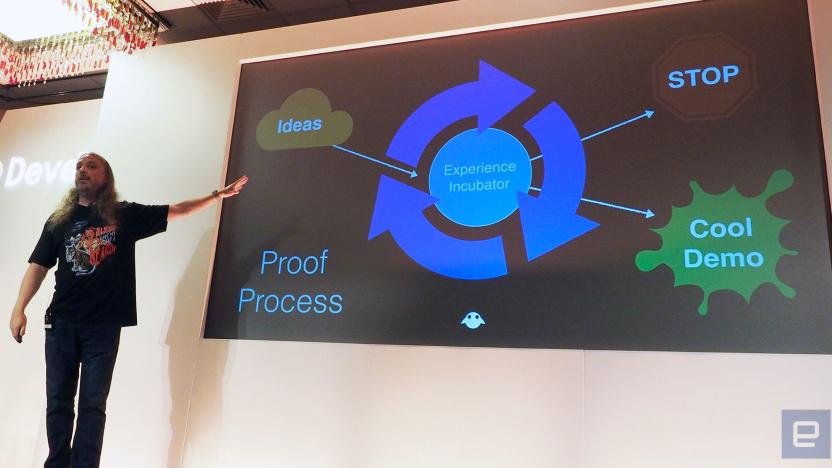graemedevine
Latest

Magic Leap is still figuring out what 'mixed reality' is
Magic Leap CEO Rony Abovitz recently said at an investor conference that the company's 'mixed reality' headset (?) "is not far away" from launch, whatever that really means. While the mysterious startup might be closing in on consumer-ready hardware, it's still in the process of discovering exactly what 'mixed reality' is. Delivering the opening keynote at gaming conference Develop:Brighton today, Magic Leap's Graeme Devine said, "There's huge expectations that mixed reality will come of the gate and, oh boy! It'll be here and it'll be just like Minority Report right away... And no, we've never seen that with any platform. So that ask is impossible."

Graeme Devine takes off with Rocket Patrol
Graeme Devine is a veteran game developer (he created The 7th Guest and then worked on Quake 3 and Halo Wars) who's turned his attention to iOS recently, putting together touch-based games meant for gamers of all ages. His latest title, which I got to see at GDC 2013 last week, is a board/card game called Rocket Patrol that runs on Apple's touchscreens. The game involves two players (you can play against the computer or asynchronously online), and has you running a rocket ship across the galaxy, trying to complete your journey before your opponent does. During each turn of the game, you get access to a hand of cards that you can play one from. Distance cards are how you win the game: Each player has a little chart of cards with various distances on them that you need to fill up, so you need to play eight cards of five light years, four of 15 and so on. As you play those cards, the chart fills up, and the first person to fill up their chart sends a rocket all the way across the screen and wins the game. Just racing would be a bit too simple, so Rocket Patrol also has red and green cards of various types. Red cards attack the other player (perhaps by sending them through a warp hole or causing some engine trouble), and then they need to play a green card to fix whatever problem you've given them. Certain green cards match up with certain red cards, so if there's a problem card on your ship, you need exactly the right green card to fix it. That's how the game goes back and forth, with the two players trying to play distance cards in between attacking each other and solving problems they've been attacked with. Devine says he got the idea for a game from an old 1906 automobile board game called Touring, but of course he's translated it to a journey across the stars. Rocket Patrol seems like some good clean fun -- and it's due out sometime this month. It'll be free to play, with some freemium elements in there for in-app purchase. Devine is also working on his very popular Full Deck Solitaire game -- he says the title "by and large is our number one platform," and that the game has reached a whopping 750,000 daily active users so far (with about four million downloads total). He's working on an Android version, thinking about bringing the game to Kindle Fire, and says players have asked for a PC version as well. Devine originally built that game just for his own family to play, so it's fascinating to hear that it's grown so big since its release a while ago.

GDC 2011: Graeme Devine on the iPad for gaming
Veteran game developer Graeme Devine took the stage at GDC 2011 this week to talk about Apple's iPad (and by extension, the new iPad 2, of course), and called it "the best gaming machine on the planet today." He went through his own thoughts on the device, talked a little bit about how developers could use the metaphor of touch to make the best games possible, and then went through a list of what he felt were the best practices for iOS development. Devine said that the first time he held an iPad, "I felt like I was holding something from science fiction in my hands. It was different from any other experience I've had before." The iPad reverses the trend in gaming to move the screen farther away from the player, and instead puts it relatively close up and personal. Additionally, the joystick is gone, and while a lot of games depend on that virtual joystick (more on that in a bit), the iPad removes any hardware between your fingers and what's happening on screen. A finger isn't a mouse, either -- rather than selecting and then clicking, fingers on iPad screens just tap and move.
